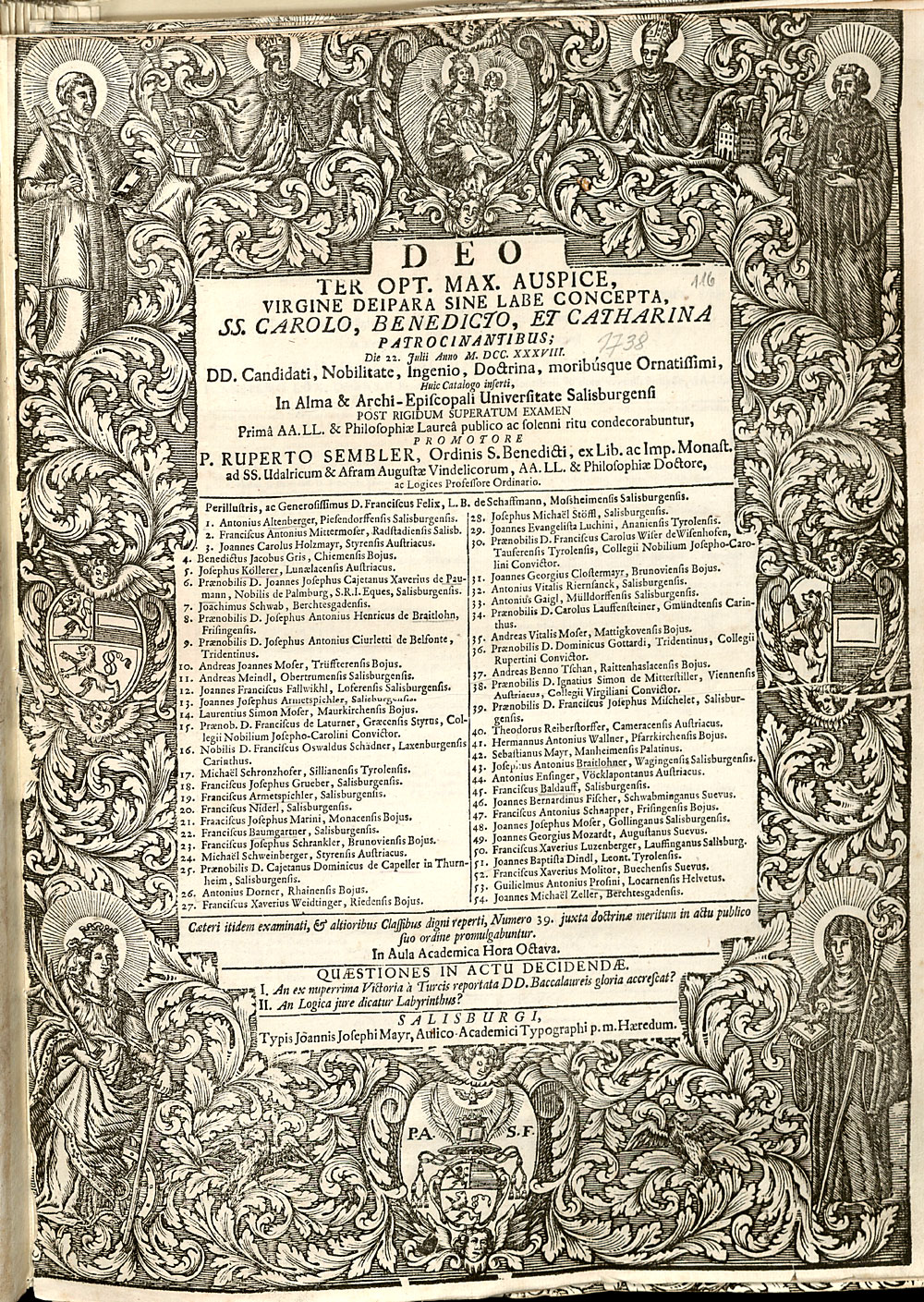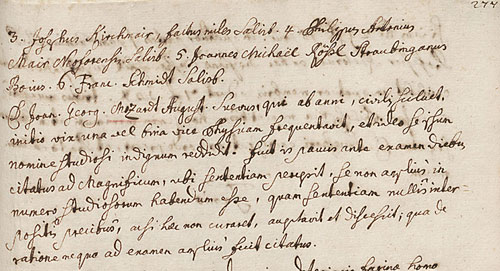The Mozarts and the Benedictine University
Leopold Mozart, oldest son of a master bookbinder, was born on 14 November 1719 in Augsburg. His family had hoped he would become a priest. He attended the Jesuit St. Saviour Grammar School (Jesuitengymnasium St. Salvator) in his hometown, from which he graduated magna cum laude, “with great praise”. He then began his philosophy studies in Salzburg on 7th December 1737, which at the time lasted two years and included the subjects of logic, ethics and physics. Philosophy was a mandatory subject for all students, and only after successful completion did they have the option of choosing between theology, law or medicine.
Entry in the university register (UAS, bA 2, fol. 256r)
Enrolment
JOANNES GEORGIUS LEOPOLDUS MOZART AUGUSTANUS SUEVUS LOGICUS. – 45 || „Johann Georg Leopold Mozart, from Augsburg in Swabia, logician. – 45 [kreuzer]“

On 22 July 1738, Leopold Mozart was awarded the degree of Baccalaureus of Philosophy. At that time, the names of the graduates were published in the order of their results on magnificently decorated copperplate engravings. Leopold Mozart was ranked 49th out of 54 candidates. The examination questions set by the philosophy professor, Father Rupert Sembler from the monastery of St. Ulrich and Afra in Augsburg, have also been preserved.
Philosophy exam paper (UAS, bA 150, fol. 116r)
Leopold Mozart’s exam questions
I. AN EX NUPERRIMA VICTORIA À TURCIS REPORTATA DD. BACCALAUREIS GLORIA ACCRESCAT? II. AN LOGICA JURE DICATUR LABYRINTHUS? || “I. Does the recent victory over the Turks bring glory to the Baccalaureus scholars?” “II. Is logic rightly called a labyrinth?”

On 8th September 1739 the rector reproached Leopold Mozart with having attended his natural science classes, which were part of his Philosophy study programme, too infrequently and having “proved disgraceful to the name of a student.” He finished his studies without complaining or begging and embarked on his musical career.
Exmatriculation of Leopold Mozart (UAS, bA 90, fol. 277r)
Leaving the University
D. JOAN. GEORG. MOZARDT AUGUST. SUEVUS, QUI AB ANNI, CIVILIS SCILICET, INITIO VIX UNA VEL BINA VICE PHYSICAM FREQUENTAVIT, ET IDEO SE IPSUM NOMINE STUDIOSI INDIGNUM REDDIDIT: FUIT IS PAUCIS ANTE EXAMEN DIEBUS CITATUS AD MAGNIFICUM, UBI SENTENTIAM PERCEPIT, SE NON AMPLIÙS IN NUMERO STUDIOSORUM HABENDUM ESSE, QUAM SENTENTIAM NULLÎS INTERPOSITIS PRECIBUS, ACSI HÆC NON CURARET, ACCEPTAVIT ET DISCESSIT; QUA DE RATIONE NEQUE AD EXAMEN AMPLIÙS FUIT CITATUS.

“Mr Johann Georg Mozart, a Swabian from Augsburg, who from the beginning of this year had hardly attended any physics lectures at all, and had therefore proved disgraceful to the name of student: a few days before the examination he was summoned before the Rector, where he received the verdict that he was to be removed from the register of students; he accepted this verdict without complaining, as if it did not concern him, and went away; for this reason he was no longer called to the examination.”
Leopold Mozart was a member of the Salzburg court orchestra from 1743, and from 1744 he was also a violin teacher at the Kapellhaus. In 1757 he was appointed court composer, and in 1763 he finally rose to the position of Deputy Kapellmeister. His Violin Tutor (Augsburg 1756) became one of the fundamental teaching works of the 18th century has attained several editions.
Music by Wolfgang Amadeus Mozart at the University
In 1761, at the age of five, his son Wolfgang Amadeus danced in the University Theatre. As young as eleven, he composed Apollo & Hyacinthus (KV 138) for the university. On the evening of the performance, he “gave exquisite samples of his harpsichord artistry” to the professors, who were weakened by blood-letting. He also composed well-known works for Judas Thaddäus Antretter von Antrettern (Finalmusik in D major, KV 185) and Georg Siegmund Robinig von Rottenfeld (Divertimento in D major, KV 334) to mark the end of their studies.
Finalmusik in D major (Antretter), KV 185
Divertimento in D major (Robinig), KV 334
Text: Christoph Brandhuber | Translations: Diana McCoy, Leonie Young
Photos: PLUS, Universitätsarchiv Salzburg (1-3)




